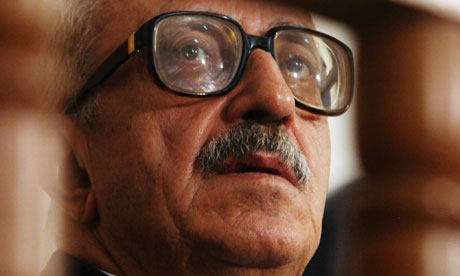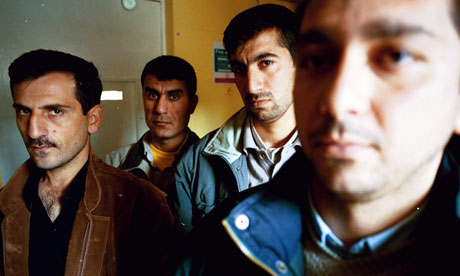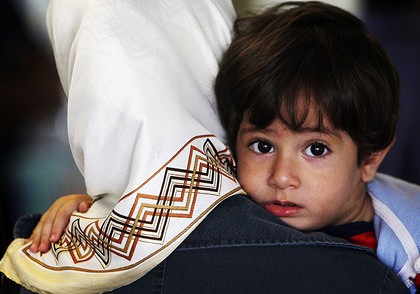| | | Talabani refuses to sign death order |  |
| | | كاتب الموضوع | رسالة |
|---|
Dr.Hannani Maya
المشرف العام




الدولة : 
الجنس : 
عدد المساهمات : 60715
مزاجي : 
تاريخ التسجيل : 21/09/2009
الابراج : 
 العمل/الترفيه : الأنترنيت والرياضة والكتابة والمطالعة العمل/الترفيه : الأنترنيت والرياضة والكتابة والمطالعة
 |  موضوع: Talabani refuses to sign death order موضوع: Talabani refuses to sign death order  السبت 20 نوفمبر 2010 - 20:43 السبت 20 نوفمبر 2010 - 20:43 | |
| Talabani refuses to sign death order  Iraq's president said Wednesday that he would not sign an execution order for the foreign minister in Saddam Hussein's government, who was sentenced to death last month.
"I will not sign Tariq Aziz's death sentence," Jalal Talabani told France 24 television during a visit to Paris for the Socialist International meeting. "I will sign no death sentence at all, because as a social democrat, I'm against the death penalty."
The statement by Talabani, who was reelected to the presidency last week, followed calls by the Vatican and Russia to halt the execution on humanitarian grounds. Aziz, 74, is in poor health. He was the most senior Christian official in Hussein's predominantly Sunni government, as well as its international face.
Talabani, a Kurd, told the French news channel that he "sympathized" with Aziz "because he is an Iraqi Christian.""Moreover," Talabani said, "he is an old man who is over 70."
The president's stand did not come as a surprise and may not prevent the controversial execution. During Talabani's earlier tenure as president, he never signed off on a death sentence, but Iraqi authorities nevertheless hanged several senior members of the former government, including Hussein.
Aziz was sentenced Oct. 26 by a special tribunal set up after the U.S.-led invasion in 2003 to prosecute senior members of Hussein's government. He was convicted of persecuting members of Shiite political parties, including Prime Minister Nouri al-Maliki's Dawa party.
Ziad Tariq Aziz, Aziz's son, said in a phone interview that the family has not heard from him in more than a month and is not sure whether his court-appointed attorney has filed an appeal, which must be done within 30 days of sentencing. The family does not have a lawyer in Baghdad.
The sentence, which Aziz's family and attorney have described as politically motivated, came amid an impasse as Iraqi politicians jockeyed for positions in a new government. The presiding judge had run unsuccessfully for parliament on a promise to "humiliate the tyrants," a reference to Hussein's government.
"We hope Talabani insists that he will not sign and that he will push the others to stop this killing of people from here and there," Ziad Tariq Aziz said. "As a family, we thank Mr. Talabani, and we want him to go to the end with this."Aziz, an Assyrian Christian born outside Mosul, was among the first to turn himself in to U.S. forces in April 2003. He was transferred to Iraqi custody in July.
By Leila Fadel, Washington Post Foreign Service Email This BlogThis! Share to Twitter Share to Facebook Share to Google Buzz 0 comments   President refuses to sign Aziz execution President refuses to sign Aziz execution  Iraq's president, Jalal Talabani, refused today to sign the execution order for Tariq Aziz, Saddam Hussein's former deputy, who was sentenced to death last month.
Aziz, the international face of Saddam's government, was convicted on charges relating to a campaign of persecution against members of the Shia opposition parties, including that of the current prime minister, Nouri al-Maliki."No, I will not sign the execution order for Tariq Aziz, because I am a socialist," Talabani told French television France 24 in an interview.
"I sympathise with Tariq Aziz because he is an Iraqi Christian. Moreover he is an old man who is over 70."His comments come after a series of vicious attacks on Iraq's Christians that have prompted many members of the religious minority to consider fleeing the country. In the most serious incident, more than 50 people were killed by gunmen inside a Catholic church in Baghdad.
Aziz, 74, was the highest-ranking Christian in Saddam Hussein's inner circle. It is unclear whether Talabani's opposition could prevent the sentence being enforced, given that his apparent refusal to sign Saddam's execution order did not save the dictator.A leading Iraqi lawyer said he believed Aziz's death sentence could not legally be carried out without the president's signature on the execution order.
"According to the Iraqi constitution, the president of the state has the power to ratify death sentences before they are carried out," said Tariq Harb.Aziz had earlier been sentenced to 22 years in jail for complicity in a bloody crackdown on merchants accused of price tampering, and a campaign against Kurds in Iraq's north.
In the long-running case for which he received the death penalty, he was accused of being part of a campaign of persecuting, killing and torturing members of the Shia opposition and religious parties banned under Saddam, including Maliki's Shia Dawa party.Aziz's supporters argue that he was not responsible for the crimes he is accused of but is being persecuted simply because he was a member of Saddam's regime.
The Vatican and Russia have both called on Iraq not to carry out the execution of Aziz, as has Italy's foreign minister.His son, Ziad, in exile in Amman, Jordan, claimed the court that convicted his father was a "theatrical performance" and that the sentence was politically motivated.
In a prison interview with the Guardian before being handed the death sentence, Aziz claimed all decisions were taken personally by Saddam and he did not participate in any of the crimes. "I was the foreign minister of the country and I had to defend the country and do everything possible to explain our position," he said. "I stayed on the side of right." He maintained that defence unsuccessfully in court.
The death sentence came two months after Aziz was transferred from US to Iraqi custody. He surrendered to invading US forces in April 2003. Under Iraqi law, Aziz has 30 days to appeal against the death sentence.
Haroon Siddique and agencies guardian.co.uk, Email This BlogThis! Share to Twitter Share to Facebook Share to Google Buzz 0 comments   Iraqi asked to go home before killing himself Iraqi asked to go home before killing himself  AN IRAQI asylum seeker who hanged himself at Villawood detention centre early yesterday ''begged'' the department of immigration to send him home.
Ahmad al-Akabi, a 41-year-old father of three young daughters, had been held for more than a year, having been processed on Christmas Island after arriving in Australian waters by boat. His death comes just two months after a Fijian detainee, Josefa Rauluni, 36, committed suicide at Villawood.
Mr Akabi is understood to have suffered severe depression in recent months and demanded to be returned to the Iraqi city of Karbala, where he had worked as a primary school teacher.A fellow Iraqi asylum seeker at Villawood who knew Mr Akabi told the Herald: ''He had become very upset and depressed and he told authorities, 'If you will not give me a protection visa then please let me go home now.'''
Speaking on the condition of anonymity, the asylum seeker added: ''He begged them to let him go back to Iraq so he could be with his family. He wanted to go home; he had girls aged two, four and seven - nobody knows why this wasn't allowed to happen.''
The Immigration Minister, Chris Bowen, yesterday confirmed that Mr Akabi had asked to be deported and admitted detainees faced a ''very stressful situation'', but his department refused to comment on whether Mr Akabi had received psychiatric treatment, citing privacy concerns.Serco, the company that runs Villawood, had also been made aware that the Iraqi was a suicide risk, said Jamal Daoud of the Social Justice Network.
Mr Akabi's friends had been watching him around the clock for the past few days ''because they were so worried about him and the authorities running the centre had been told this as well,'' Mr Daoud said. ''His wife had asked him to come home recently as she was struggling to cope and this put great pressure on him. He told his friends he was going for a cigarette and when he didn't return they started looking for him.''
Friends found Mr Akabi in a toilet at 12.40am. It is believed he used the drawstring cords from three pairs of shorts to take his life. A Serco guard tried to resuscitate him but he was pronounced dead at Liverpool Hospital.
A spokesman for the Refugee Action Coalition, Ian Rintoul, said Mr Akabi's death was ''easily preventable'' but warned more detainees would harm or kill themselves if mandatory detention of asylum seekers were not stopped.
''Detention was supposed to be a last resort but now it's the first,'' he said. ''We will see more terrible incidents like this unless there's a change.''Mr Akabi, who said he had fled Iraq after being attacked by religious militias, had twice been denied refugee status.
However, he would have been eligible to challenge those decisions after the High Court recently found the refugee assessment process lacked procedural fairness. It is unclear whether he was aware his claim could have been revisited.About 160 detainees reportedly went on hunger strike in response to the suicide.Police are investigating the death. Serco will provide the Immigration Department with a report.
Tom Reilly, Sydney morning Herald Email This BlogThis! Share to Twitter Share to Facebook Share to Google Buzz 0 comments   Labor responsible for another suicide Labor responsible for another suicide  A tragic suicide by an asylum seeker inside Sydney’s Villawood Immigration Detention Centre early on Tuesday morning—the second in two months—has highlighted the inhumanity of the mandatory detention regime that is being continuously expanded by the Gillard Labor government.
This week’s victim, Ahmad al-Akabi, hung himself in a toilet block. A 41-year-old Iraqi school teacher with three young daughters, he had been detained for more than a year, initially on the Indian Ocean territory of Christmas Island, after arriving in Australian waters by boat. His death came only two months after a Fijian detainee, Josefa Rauluni, 36, leapt to his death off a roof at Villawood just before he was due to be deported back to Fiji.
Both deaths fuelled anger and dismay among other detainees, leading to rooftop protests. Yesterday, five asylum seekers climbed on top of a compound, displaying a banner that called for “protection, not detention” and asked “who’s next?” About 160 prisoners reportedly began a hunger strike on Tuesday morning and around 22 Iranians continued their strike into yesterday.
Al-Akabi fled Iraq after being attacked by religious militias. The Australian government, however, had twice denied him a refugee protection visa. He is understood to have suffered severe depression in recent months and demanded to be returned to the Iraqi city of Karbala, where he had worked as a primary school teacher.
A fellow Iraqi asylum seeker at Villawood, who knew al-Akabi, told the Sydney Morning Herald: “He had become very upset and depressed and he told authorities, ‘If you will not give me a protection visa then please let me go home now’… He wanted to go home; he had girls aged two, four and seven. Nobody knows why this wasn’t allowed to happen.”
A former Iraqi detainee, Saad Tlaa, who had also been incarcerated for more than a year, told ABC radio on his mobile phone that al-Akabi had been worn down by being in detention so long. Tlaa said he was seriously worried about the mental health of other detainees, including those who climbed on the roof. “Some [people are] upset,” he said. “[People] feel down, they feel, ‘what’s the future of our case?’ Or ‘what’s the future for our application’?”
Immigration Minister Chris Bowen flatly defended his government’s treatment of al-Akabi. He claimed that the asylum seeker had twice asked to be removed to Iraq, but had changed his mind. “So acts had begun to remove him involuntarily,” Bowen told ABC radio. “Now, that is obviously very stressful for everybody involved, particularly him, and these are always difficult cases. But it doesn't mean that we cannot implement our laws, which are that if you are not accepted as a refugee … then we need to take steps to remove you.”
Bowen also claimed that the government had put in place “a rigorous mental healthcare program”. However, he and his department refused to comment on whether al-Akabi had received psychiatric treatment, citing privacy concerns. The department said Serco, the global contractor that operates Villawood and other Australian detention centres, had been made aware that the Iraqi teacher was a suicide risk.
Whether mental health procedures were instituted or not, responsibility for both suicides lies squarely with Prime Minister Julia Gillard’s Greens-backed government, which has maintained and extended the punitive policy of indefinite detention in defiance of widespread public disgust. Mass opposition toward the detention regime was a key factor in the Howard Liberal government’s defeat in the 2007 election. Labor promised a more humane policy, and that people would be released from detention within 90 days of their arrival, but instead the system has been expanded.
Across the country, detention camps have been opened or reopened, including in remote, inhospitable military bases, taking the total holding capacity to close to 8,000. Already there are more than 5,000 detainees in increasingly over-crowded facilities, well above the total incarcerated in the Howard years, when numbers peaked at just under 4,000 in 1999 and 2002. More than 700 of the prisoners are unaccompanied minors—children and teenagers travelling without parents.
On September 1, 90 Afghani asylum seekers broke out of the Northern Immigration Detention Centre in Darwin and staged a peaceful protest, pleading with authorities to re- examine their failed bids for refugee status.
In another symptom of the rising tensions and distress caused by prolonged detention, up to 50 unaccompanied Afghani teenagers were involved in fights last Sunday that broke out in the dining room of the Melbourne Immigration Transit Accommodation facility at Broadmeadows. The number of detainees at the Broadmeadows centre, originally built for 30, swelled to 136 last weekend, after 98 teenagers arrived from Christmas Island.
Several demountables have been set up for the new inmates, but refugee advocate Pamela Curr said the fight illustrated overcrowding problems, with only six computers for the youth to share. “Those rooms were designed for one, (but) they’ve put two double bunks in each room with a metre of space between the beds,” she said.
Mental health professionals, including the government’s detention health task force chairperson, Professor Louise Newman, have warned that detainees’ mental health inevitably deteriorates after 12 months of incarceration, especially when they remain in limbo, not knowing when, or if, they will ever be released.
Some media outlets suggested that al-Akabi could have appealed to the courts against his deportation, following a unanimous High Court decision last week that ruled invalid some aspects of the government’s “Refugee Status Assessment” system. That system bars asylum seekers from access to the courts to challenge refusals of protection visas. Many commentators hailed the ruling as a victory for refugees, but the judges left the detention regime itself intact. Under the Migration Act, which the court upheld, Bowen retains a sweeping discretion to not even consider a refugee application, or to reject it “in the public interest”.
Nevertheless, the government immediately declared its intention to find ways to overcome or circumvent the High Court’s ruling. Among Gillard’s proposals is to build a detention facility in East Timor, thus taking asylum seekers outside Australian legal jurisdiction. Even if detainees retain the right to go to court, the government is certain to fight them, potentially all the way to the High Court on each occasion, to defeat their visa applications. As a result, thousands of people could be detained for years, worsening the over-crowding, fuelling protests and multiplying mental health breakdowns
Mandatory detention was introduced by the Hawke and Keating Labor governments in the early 1990s. The Gillard government is maintaining and expanding it, but this time relying upon the parliamentary support of the Greens, who are now functioning as enablers of Labor’s entire immigration agenda, despite their limited “criticisms” of some of its most barbaric features.
By Mike Head, World Socialist Web Site | |
|   | | | | Talabani refuses to sign death order |  |
|
| | صلاحيات هذا المنتدى: | لاتستطيع الرد على المواضيع في هذا المنتدى
| |
| |
| |





